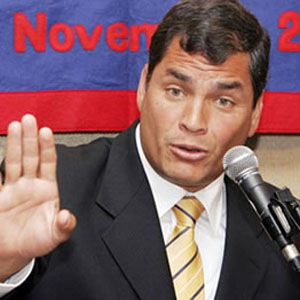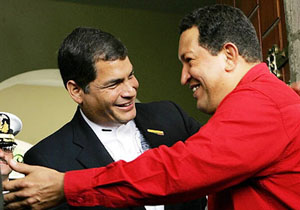 |
International Affairs
U.S. ‘Savagely Attacked’
Toby Westerman
The pro-Marxist president of Ecuador, Rafael Correa, gave a formal address to China’s Academy of Social Sciences in Beijing, China. The address given in November 2007, detailed the spread of Socialism in Latin America and its importance to the Peoples Republic of China.
Although Correa’s remarks concerned the entire Western Hemisphere and the most populous nation on earth, the United States, the press gave it scant attention.

In Beijing, Marxist President Correa acclaims the expansion of Socialism in Latin America, a reality that Americans don't see |
Entitled “Socialism of the 21st Century,” Correa’s speech “savagely attacked” U.S. economic policies, and lauded the progress in Latin America of “21st century Socialism,” a form of Marxism propagated by the president of Venezuela, Hugo Chavez.
Details of the speech were reported by Radio Havana Cuba, an official broadcasting service of the Cuban government.
Correa’s audience included Chinese academics, researchers, and Latin American diplomats. The speech had been a top priority for Correa, who earlier met China’s president, Hu Jintao, and concluded a number of wide-ranging trade agreements between the two nations.
During his visit to China, Correa also offered Beijing the use of the air base at the city of Manta, describing it as a potential “doorway” to South America. China is interested in furthering its already extensive presence in Latin America, which ranges from gambling casinos to sophisticated spy bases.
Currently the U.S. military operates the base at Manta, which is used for anti-drug surveillance flights. The U.S. lease on the base ends in 2009, and Correa has already said that he will not renew it.
While U.S. politicians, think tank personnel, and media express uncertainty, even confusion, as to the path China is taking, Correa’s speech and his friendly reception leave little doubt as to the commitment to Marxist Socialism by the Beijing political elite. The “21st century Socialism” preached by Correa is based upon a Latin-oriented Marxism with elements borrowed from communist theorists from Vladimir Lenin to Fidel Castro.
The political elite of China are engaged in research on strategies that can ensure the survival and spread of Communism, and they are interested in the Latin American experience. Until 1999 Cuba was the only communist nation in Latin America. Chavez took power in that year and began the process of changing Venezuela from an oil-rich ally of the United States to an uncompromising opponent.
Chavez openly supports fellow socialists in the region. By 2005 Chavez ally Evo Morales was elected president of Bolivia, former Marxist guerrilla Daniel Ortega regained the presidency of Nicaragua, and in 2006 Correa was elected president of Ecuador. The same year Correa won office, Mexico nearly elected Chavez admirer Lopez Obrador as its president. Chile, Argentina, Brazil have governments sympathetic to varying degrees to Chavez’s political theories.

Correa embraces Chavez and his plan for Latin America's "21st century Socialism" |
The “Socialism of the 21st Century” which Correa detailed in China is indigenous to the Latin American region. The success that this form of Marxism has encountered so far is due to the efforts of Chavez, Castro and their followers. Castro showed that America can be defied, and Chavez is spending his nation’s wealth to finance the subversion of much of the Western hemisphere.
America’s near abandonment of the region has been of immeasurable assistance to Socialism’s march in the region.
China’s scholars, academics, and politicians are taking careful note of Correa’s remarks. They want to know what aspect of “Socialism of the 21st Century” is applicable to China, what improvements could be made, and how China can aid the process.
What is going on among the Marxist theoreticians in Beijing, Havana, Caracas, and Quito involves the careful application of the principles of oppression. Class hatred and the exploitation of social problems have always been part of the socialist revolutionary process; but now the science of social manipulation is more important than ever.

Posted December 17, 2007
Toby Westerman publishes
International News Analysis - Today
An investigative and uncompromising weekly analysis of the world situation
Contact T. Westerman at
www.inatoday.com
or P.O. BOX 5182, Rockford, ILL, 61125-0182
|
International Affairs | Hot Topics | Home | Books | CDs | Search | Contact Us | Donate

© 2002- Tradition in Action, Inc. All Rights
Reserved
|
 |
|